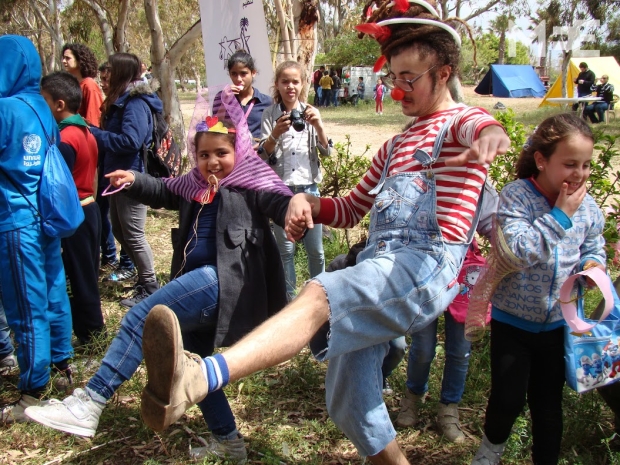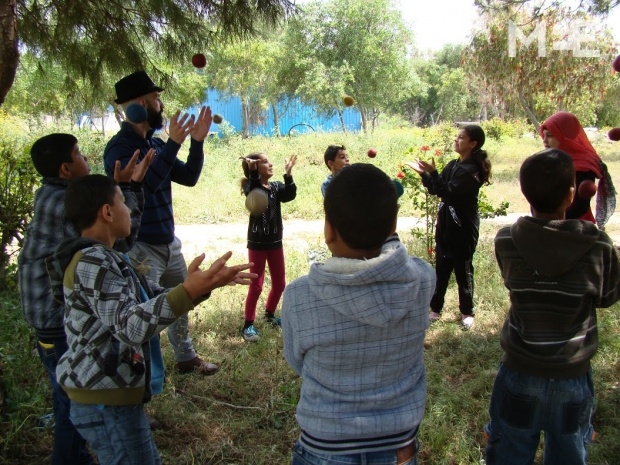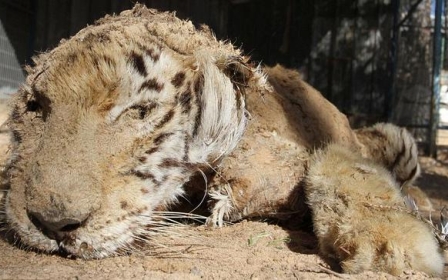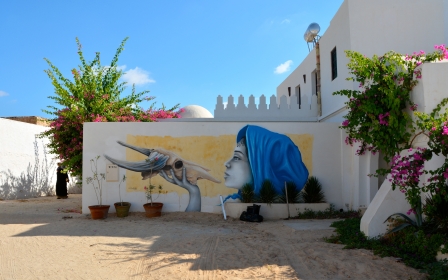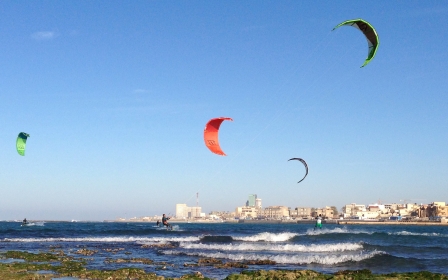Among refugee children, laughter replaces the sound of bombs
Around 100 children, Syrian and Lebanese, came together on a sunny day in Barouk public school in the Chouf district, southeast of Beirut, for a puppet show. In front of “Qu'il pleuve des poussins” (“A rain of chicks” in English), presented by the Khayal Theatre Company, they laughed, yelled and sang, thoroughly entertained by the story of “Sousou”, the chick that lost his parents and goes on a journey to find them.
This initiative, a collaboration between the international organisations UNICEF and Terre des Hommes Italy, was created to talk about human rights with both local and refugee children, through puppets, songs and theatre. It is one of the many projects made for younger refugees in Lebanon that focus mainly on art and the circus.
According to the United Nations High Commissioner for Refugees, around 1.2 million Syrian refugees live now in Lebanon. Fifty-three percent of them are under 18 and have experienced traumatic conditions of life. Lack of education, food, hygiene and fun can severely affect their mental condition and basic well-being.
Various NGOs, associations and individuals are trying to help them the best they can, through classes, donations and care - but also entertainment, so they can find, if only for a few hours, a moment of happiness. Programmes such as circus arts and training give them some focused attention and helps their emotional well-being.
In December, close to the village of Mansoura in the Bekaa Valley, eastern Lebanon, around 40 children were waiting for instructions from Nicolas Haddad, programme coordinator for Lebanese circus association Cirquenciel, in a circus training programme with the NGO Doctors of the World. The event was one of a series of sessions held in different locations and informal camps across the country.
For the first session, Haddad shows them how to use various juggling tools: stick flower, devil stick, balls and diabolo. Puzzled, the children try to make sense of the objects in front of them, before the juggler brings them back on the right path, in a demonstration that ends with a performance the parents also enjoyed watching.
Entertain against depression
“We live in a passive society engaged with internal conflicts, stressed out,” said Johnny Girges, founder of Cirquenciel. “People do not take the time to smile and play, yet it is important to keep moving forward without cracking. The circus is a care, a cure. We are responding to a basic need, a response to the urgency of the situation through a psycho-social support, a momentary break.”
The group aims to fulfill a basic need for the children, to recapture their sense of childhood again. This is a vitally important initiative for Amer Kabakibo, a doctor from Bordeaux, France, but native from Homs, who came to settle in Lebanon to provide assistance to populations at risk and founded the ADN Centre for Mental Health in Tripoli. “The psychological structure of the child is based on the game. When they lose everything, playing helps them to restructure their lives, find a frame.
"The circus is a way to peace and reconciliation,” added Girges. “We are working with refugees, children and their families to change their routine but also provide psycho-social support by sharing with them something new, mix them in a common activity that could reconstruct a family environment through playing.”
The association also helped in the creation of circus groups after meeting with Syrian artists in Lebanon, through personalised coaching for the young talents they spotted during workshops.
In parallel with Haddad's training, the workers from Doctors of the World are trying to spot difficult cases among the children in order to direct them to psychological therapies. The main symptoms that MDM employees face are anxiety, depression, bed wetting, social isolation and elocution problems. It's hard to think of these disorders when seeing the kids' mouths wide open in front of a particularly high diabolo launched by the juggler. A sense of well-being that is summed up by Hayat, a 10-year-old girl participating in the workshop: “It's different from usual, that's great! Once we have something to have fun with, it's fine. I'm not used to play with boys, but that's okay for today.”
“These activities are part of our work for psycho-social support,” said Omar Hamiko, one of the community health workers of Doctors of the World, a native of Aleppo. “They are very healthy for the children. They have suffered a lot, and need to have fun. This also allows us to identify the most troubled cases and redirect them towards mental health clinics that we operate in partnership with AMAL Association. Often, they are beaten by their families or face a lot of violence, not to mention the stress generated by the precariousness of their situation, so we work on adult anger and child support."
Laughter, the key to childhood
Entertainment seems to be the preferred option to get these young victims of the Syrian war out of their daily depression bubble. Sabine Choucair, a Lebanese social therapist and artist who co-founded the group Clown Me In, has participated with the international association Clowns Without Borders on a tour in 19 informal refugee camps in Lebanon last June. More than 3,800 children were able to addend these clown shows.
“We just go there to have fun, with no particular message,” she said. “It is our mission to spend time with refugees. We offered them a little clown show with circus arts and live music. They have fun for an hour, see something different than the usual.” The recipe to this hour of entertainment? “Magic, laughter and dreams,” she said. “When children laugh, it is with all their heart, it relaxes them. And the fact that it is just a little beautiful something, they keep the magic in them, just the feeling of the show stayed with them after we are gone.”
Most of the Syrian children she encountered never had seen a clown before, which, in her opinion, “added to the exception of the moment we spent together. "
They spend 10 minutes wondering what to do with us, puzzled, then enter the game,” Choucair added. “Their reactions were great fun, between those who were dazzled and the ones who absolutely wanted to touch us.”
She recalled some comments with the children, particularly one that really touched her: “Today is better than yesterday. Yesterday, we were playing football, but today we saw you.” Or another, from a mother this time: “We are used to the sounds of missiles, bombs... We need moments like these in order to remove fear from our hearts.”
Or, again, with juggling knives: “In the end, they are the ones that have the most success. I don't understand, but it's always nice to see their reaction. When they understand that this is a game, they are just fine, so it's a good way to tackle serious and grave matters, they need it. And we are looking so ridiculous that they start to understand that they are the clever ones in the story we play.” The young woman concluded, smiling: “Laughter is good for the body and the mind. It can serve as a psycho-social support, but also be an introduction to art, which is important for everyone.”
New MEE newsletter: Jerusalem Dispatch
Sign up to get the latest insights and analysis on Israel-Palestine, alongside Turkey Unpacked and other MEE newsletters
Middle East Eye delivers independent and unrivalled coverage and analysis of the Middle East, North Africa and beyond. To learn more about republishing this content and the associated fees, please fill out this form. More about MEE can be found here.


